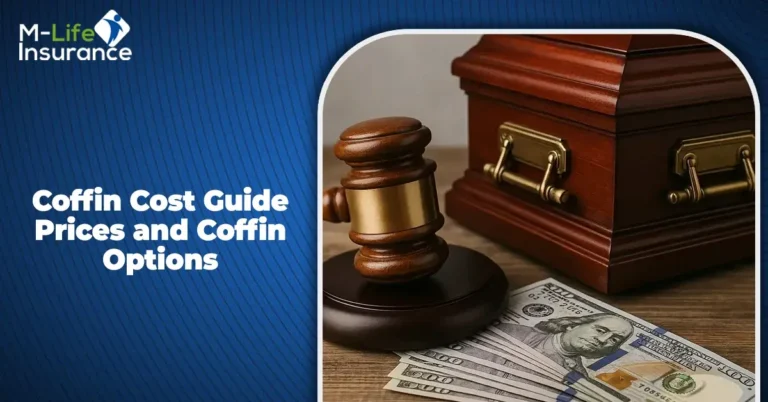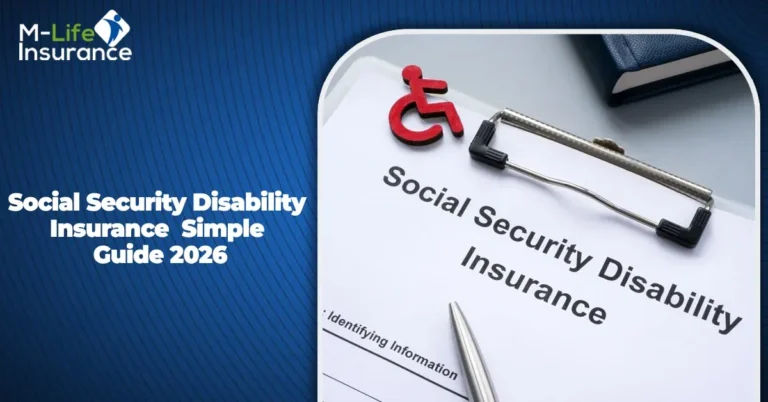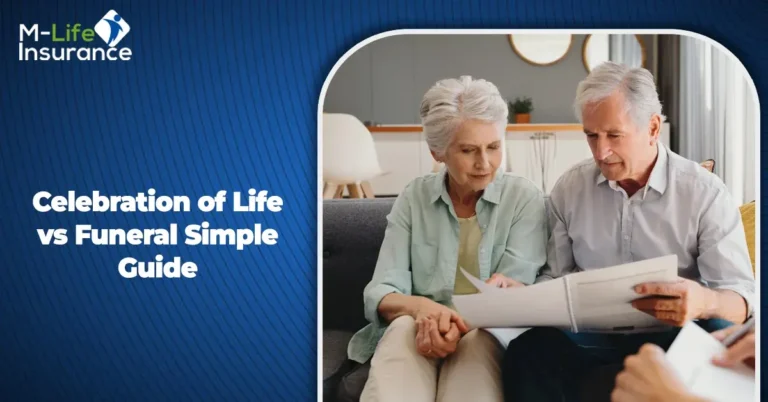Last Updated on: September 15th, 2025
- Licensed Agent
- - @M-LifeInsurance
Key Points
- Universal life: lifelong, flexible, builds cash value
- Term life: temporary, affordable, no cash value
- Whole life: lifelong, fixed, guaranteed cash value
- Choose based on needs, budget, and goals
Choosing the right life insurance for your family is so important. This will be their future financial help if something unexpected happens to you. Lets have a look at the two popular types of life insurance that are universal insurance and term life policy. Both have different benefits, different costs, and uses, all the things are depending on what you need. In this guide, we will explain the differences between them, show what a universal insurance policy is, and compare it with whole life and term life policy.
What Is Universal Life Insurance?
This is a type of life insurance policy that will cover you for your whole life. It means that it will not just give your coverage but also it save your money. This policy will not work like a term life policy that only covers you for a set number of years, this life insurance will keep you protected as long as you keep paying your monthly premiums.
Key features:
Flexible premiums
You can adjust your premium payments over time that is according to your your financial situation.
Cash value growth
The part of your premium goes into a cash value account that will grow over time, this amount is usually tax free.
Adjustable death benefit
You can increase or decrease the coverage amount, within certain limits, to fit your changing needs.
Potential to borrow
You can borrow against the cash value, though it may reduce your death benefit.
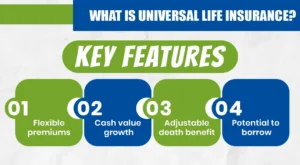
What Is Term Life Insurance?
This life insurance is a type that is very straight and east to understand. In this term insurance you have to choose the time that for how long you want your coverage like for 10, 20, or 30 years. If the insured passes away during the term, beneficiaries receive the death benefit. However, if the term ends while the insured is still alive, the policy expires unless renewed or converted.
Key features:
- Affordable premiums
Term life usually costs less because it only covers you for a set time.
- Simple structure
It doesn’t have a savings part, so it’s easy to understand.
- Specific protection
Good for paying things like a house, college, or other temporary needs.
- Convertibility
Some term plans can be changed to permanent life insurance, like universal or whole life, later after buying the plan.
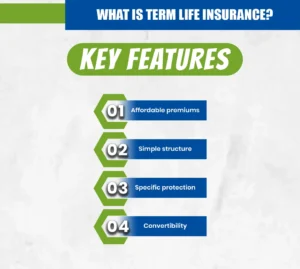
Universal Life Insurance vs Whole Life Insurance
Many people compare universal vs whole life insurance because both are types of permanent coverage. Here’s how they differ:
| Feature | Universal Life Insurance | Whole Life Insurance |
| Premiums | Flexible | Fixed |
| Death Benefit | Adjustable | Fixed |
| Cash Value Growth | Varies based on interest rate | Guaranteed growth |
| Policy Loans | Allowed | Allowed |
| Ideal For | Those who want flexibility and potential investment growth | Those who want predictability and guaranteed cash value |
Term or Whole Life Insurance
If you are compare the term life insurance vs whole life insurance, it’s important to understand your financial goals.
| Feature | Term Life | Whole Life Insurance |
| Coverage Duration | Fixed term (10-30 years) | Lifelong |
| Premiums | Low and affordable | High |
| Cash Value | None | Builds over time |
| Best For | Short-term protection | Long-term, permanent protection |
| Cost | Affordable for most | Long-term, permanent protection |
Term Life Insurance Quotes & Costs
Getting quotes for term life plan will help you find the best plan. The price depends on your age, health, how much coverage you want, and the for how long you need to be cover;
- 30 years old: $15–$25 per month for $250,000 coverage
- 50 years old: $50–$100 per month for $250,000 coverage
You can save money by comparing different companies insurance plans and using online quote tools. Monthly premiums can go up as you get older or if your health risks, so it’s smart to get coverage early when you are young and healthy.
How Much Does Life Isurance Cost?
Cost Of The Plan
Universal insurance costs more than term life plan because it will last for your whole life and it has a savings or the investment part. The cost of the plan can change depending on:
- age and health of the insured person
- Desired death benefit
- Policy features and riders
- Amount allocated to cash value
Term vs Whole vs Universal Life Insurance
Comparing term vs whole life insurance vs universal insurance can be confusing, but here’s a simple breakdown:
| Feature | Term Life | Whole Life | Universal Life |
| Duration | Temporary | Lifetime | Lifetime |
| Cost | Low | High | Medium–High |
| Cash Value | No | Yes, guaranteed | Yes, flexible |
| Premiums | Fixed | Fixed | Flexible |
| Best For | Short-term protection | Long-term predictability | Flexible lifelong coverage |
Whole Life Insurance vs Universal Life Insurance Policy vs Term Life Plan
Here’s a quick comparison of whole life insurance vs universal life insurance vs affordable term life insurance:
| Feature | Term Life | Whole Life | Universal Life |
| Duartion | Temporary | Lifetime | Lifetime |
| Cost | Low | High | Medium high |
| Cash value | No | Yes | Yes |
| Premiums | fixed | Fixed | Flexible |
| Best for | Budget conscious | Long term planning | Flexible goals |
Final Thoughts
When you are choosing the universal life and term life policy, you have to consider your goal and how long you need the coverage. This will make everything so smooth and easy.
Choose the best term life insurance if you want affordable protection for a specific period.
You can choose universal life insurance if you want lifelong coverage with flexible options and that has the ability to build cash value.
But make sure whatever you are selecting, it should match your budget and your needs so that will be the best decision for you and your family.
Not sure which plan is right? Start by comparing quotes from Mlife Insurance and consult a licensed expert from our team. The right plan gives peace of mind—for you and your loved ones.
FAQS
What is better, term life insurance or universal life insurance?
The best life insurance depends on your needs, if you look for something that is affordable and give you coverage for set time then you can go for term life, but if you want a lifelong coverage with flexibility then the universal life is best option for you to buy for your family.
What are the disadvantages of universal life insurance?
While universal insurance is giving a lot of benefits it also has some drawbacks, like it has higer cost that you have to pay high monthly premiums and also it has complex structure and there are also cash value risk that what if it can not grow as you expected.
So before buying it’s very important to fully understand how the policy works and review projections before committing.
Which one is better, life insurance or term insurance?
This can be confusing because term insurance is actually a type of life insurance. But when people say “life insurance,” they often mean whole life or universal insurance. These types last your whole life and also save some money (called cash value). Term insurance is more basic, it only lasts for a certain number of years and doesn’t save money.
Which one is better, term life or whole life insurance?
Term life insurance is a good choice for most people because it’s simple and cheaper. It gives you coverage for a set number of years, like while you’re raising kids or paying off a home loan.
Whole life insurance costs more, but it lasts your whole life and also saves money (called cash value) that grows over time.

Joyce Espinoza, Expert Life Insurance Agent
Joyce Espinoza is a trusted life insurance agent at mLifeInsurance.com. She’s been in the insurance industry for over ten years, helping people, especially those with special health conditions to find the right coverage. At MLife Insurance, Joyce writes easy-to-understand articles that help readers make smart choices about life insurance. Previously, she worked directly with clients at Mlife Insurance, advising nearly 3,000 of them on life insurance options.


